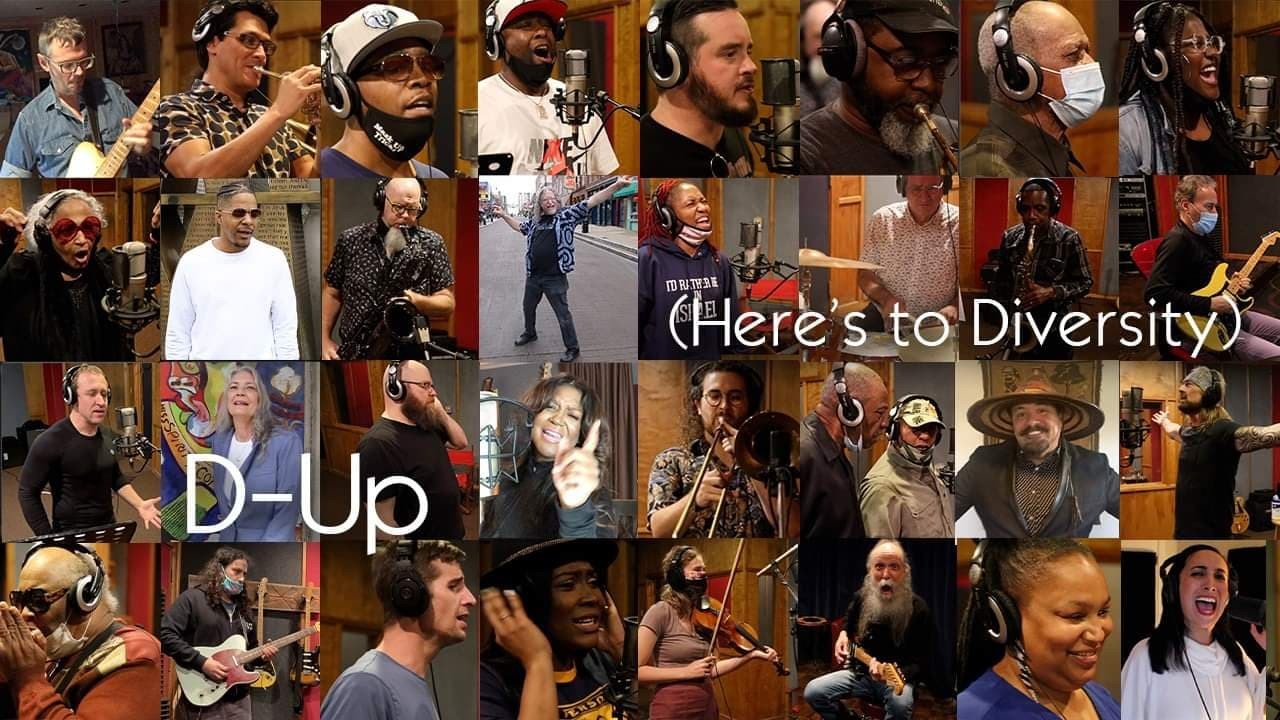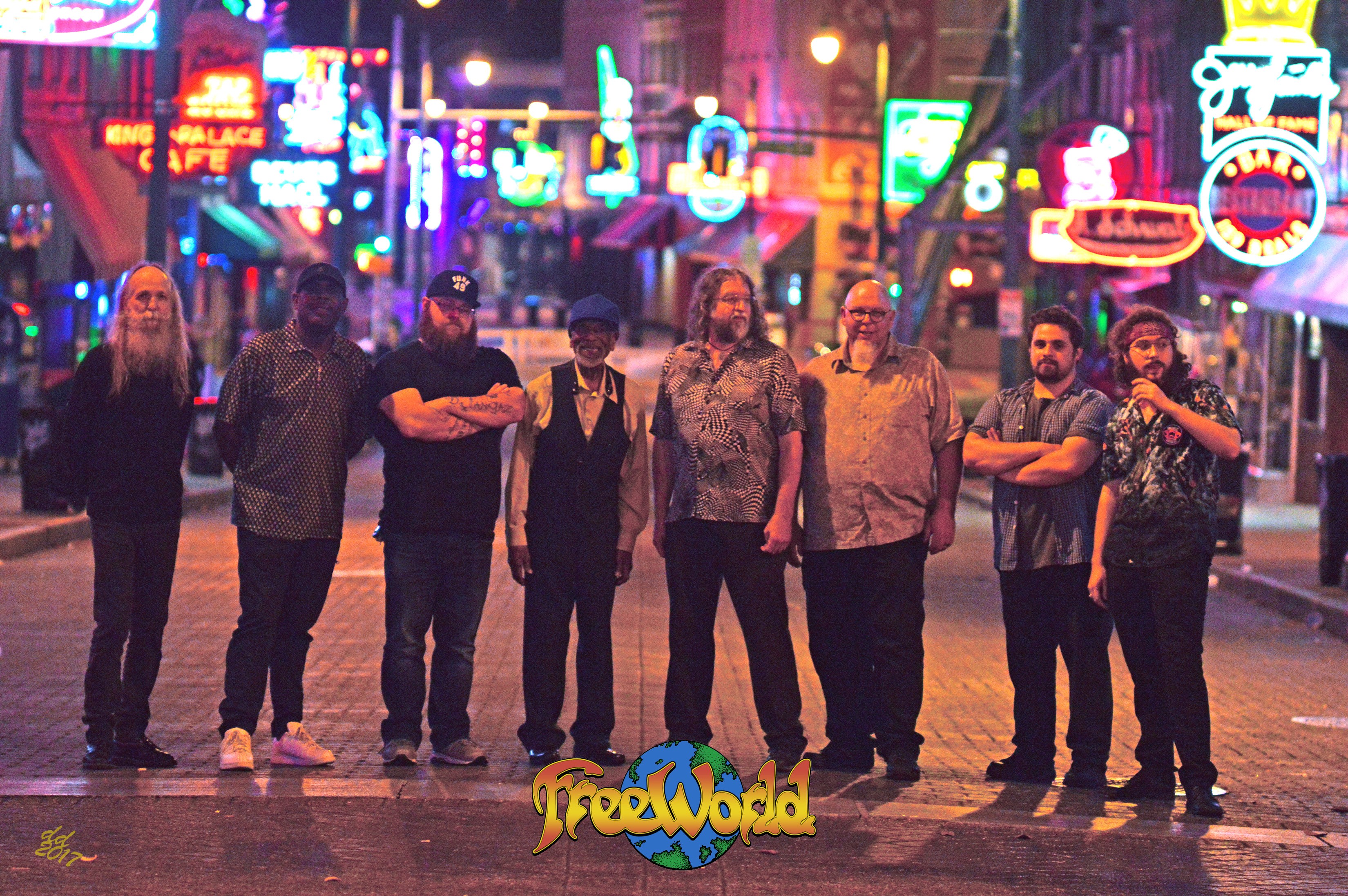There I was, minding my own business, when Richard Cushing, co-founder of funk/soul/jam stalwarts FreeWorld, reached out to me excitedly. Something about his tone suggested this wasn’t just your typical heads up about a show or a record release. No, this was something big. Then I followed the link he sent, and I was amazed. Out of nowhere, seemingly, his band just dropped a new track and video that wasn’t just his band. It included talent from nearly every walk of the city’s musical life. This was a slice of history.
There, trading verses, were some of the city’s finest singers, from Joyce Cobb to Al Kapone, from Wendy Moten to Hope Clayburn to Earl “The Pearl” Banks, from Larry Springfield to Harold Thomas and Robert Wrightsil of the Masqueraders. And, beyond FreeWorld, the band included the likes of Luther Dickinson, Alice Hasen, and Blind Mississippi Morris. All of them were lifting their voices and their instruments to celebrate the same thing: diversity.

How did such a thing come about, in a pandemic, no less? I rang Richard and this is what he told me.
Memphis Flyer: How on Earth did you make such a huge project happen in the middle of quarantine?
Richard Cushing: It was pretty much a logistical nightmare. But it was all for the right purpose and everybody pitched in. Everybody contributed. No one asked for anything back. They were just like, “Oh yeah, count me in.” It took some doing, and I couldn’t have everybody singing together in a big room, which was part of the original vision, because of COVID.
It really holds together, nonetheless. “D-Up” was an older song by the band, wasn’t it?
It was released on our 1999 CD called Diversity. Ahead of its time, apparently.
So, how this came to be: We didn’t play any gigs at all from mid-March to mid-June last year, except for a couple things. But in early August, we were playing, and I was singing that song, and it was as if I’d never heard the words before. With all the George Floyd protests and everything that was going on in our society at the time, I’m singing the words to the song and it just struck me. This is while I’m singing the song onstage, in front of people. I go off on this tangent in my brain. Thinking, “Wow, maybe we should go back in the studio and maybe re-cut it? What if we went back in the studio and did sort of a Memphis ‘We Are the World’ thing, and I could get everybody involved? It’d be really cool!” Again, while I’m singing and playing bass and entertaining a room full of people, my brain is going off on this tangent, thinking, “This song, it’s perfect for our culture right now!”
On top of that, David Skypeck wrote the lyrics. He’s been my dear rhythm section brother for thirty years, who had health issues a while back and a stroke, and can’t play. This song is one of his babies. It’s one of his better outputs. So, to make that song something more than it was, in honor of him, was also an essential part of the equation. To give him a reason to be proud of what he’s done and what he’s still part of. That was as important as any message in the song. It was his work. So I let it percolate in my brain for a week or so, and it grew in my mind. As the seed took root and grew into Jack and the Bean Stalk, I’m thinking, “Gee, we could get Al Green and it would be awesome!” And of course that had to be tempered.

FreeWorld
So you rerecorded the song from scratch? That must have been an achievement in its own right.
I needed a producer, and I knew I wanted to take what had been the saxophone solo and insert a hip-hop section. Hip-hop’s a prominent part of our music community now, although I’m not personally that connected to it. But I knew a lot of rap guys do their work at Cotton Row. So what I needed was a Memphis Quincy Jones [famed producer of “We Are the World”], who could take this vision I had and make it real. And God bless Niko [Lyras]. He bought in 100 percent. He heard my vision, ran with it, and did more with it than I could have ever dreamed of.
He brought in more people that I don’t have connections with, and did the mix! Can you imagine having all these people, and having 150 tracks of things, to try to sift through all that and make sense of it? I can’t give Niko too much credit. He was our Quincy Jones.
First things first, you’ve got to have the audio. And with it being 2020, not 1999, we thought, let’s update it. Everyone who came in heard the original version, but we told them, “Make it your own thing. Sing your own way.” So it grew, using multiple genres. Rock, pop, country, contemporary blues, traditional blues, traditional jazz, jeo-jazz, R&B, soul, rap, hip-hop, hard rock, Latin, funk, gospel, zydeco, doo-wop … I mean, wow!
So you really built diversity into the work itself.
Every different piece of Memphis that I could think of, I tried to get someone I knew that was connected with to do it. And to try to get that on a video that showcased the Memphis music community to the whole world. Diversity is the basis of everything. If every flower smelled the same, life itself wouldn’t happen. And the message of the words that David wrote originally and the video itself exemplified and showed that, you know?
It’s funny, David’s original inspiration came from Tigers basketball. He obviously wrote the lyrics about racial and cultural diversity, but he is also a huge Memphis basketball fan, and the phrase, “D-Up!” came directly from the mouth of none other than Coach Larry Finch, as he would run up and down the court imploring his men to get back on defense by yelling, “D-Up! D-Up!”
Doing this in the era of quarantine must have been a challenge.
It brought a lot of the Memphis music community together in a time when most people weren’t working at all. And that gave us something to focus on: Come to the studio, do a little work, and hang out. And wear a mask and stay apart from each other. Niko was also very intense about that. It was his studio and his space, and you didn’t come in without a mask. We were not gonna be a super-spreader video event, you know?
So, as people came in one by one, you made videos of them in the studio.
In my mind, the ultimate thing was the video, right? Because the audio of course has to be there, and is the basis for all of it, but it’s powerful to watch all the men and women and Black and white and brown and straight and gay and Christian and Jewish, and every sort of person I could bring in.
Justin Jaggers was our video guy, and he was there for almost every session where we were recording vocals and instrumental tracks. And we did some traveling around the city, to get some location shots. So the video could have a little bit of Memphis in the background, and so it wasn’t all just in the studio. And I’ve gotta give all kinds of credit to Justin — I can only imagine having all that video and having to edit it down to something that made sense. It was an incredible amount of work, and these people bought into the vision and they wanted to be part of it. I can’t thank Memphis enough, and all the people who contributed.
We’ve got some of everyone. Like the old-guard, established people, and new, up-and-coming folks. I really wanted it to mirror Memphis today. With the exception of not having Al Green on it, it came out exactly as I imagined, if not better.
I love how some of the singers play off each other, with a call and response. Were they in the studio at separate times?
Very few if any were actually performing together. Because people were told to just do it your way, you’d have two or more people doing the same line, and it just so happened they ended up in harmony with each other. Because Wendy Moten’s singing up and Larry Springfield’s singing down. And they happen to match up. And that goes to Niko, to have sifted through everything that everyone provided. Because everybody sang a mish-mash all across the song, and Niko had to put it together in a way that made sense. And then Justin had to got through all the video he had and try to match it up with the audio.
Who was playing in the band?
FreeWorld: George Lawrence on drums, myself on bass, Andy Tate on guitar, and Chris Stephenson on keyboards. And there were a bunch of people who played guitar, in addition to Andy. Niko played here and there, and Luther Dickinson. Alice Hasen played some violin, Blind Mississippi Morris played some harmonica, and there was a six-piece horn section, including Hope Clayburn and Paul McKinney and Lannie McMillan. Of course, the song’s about diversity, so we thought, let’s see what we can do to make it look that way. To be that way. Because Memphis has always been that way, going back to Stax and Booker T. and the M.G.’s, way before it was cool or appropriate in society. We’ve been doing that here for a long time.
I know Herman Green helped you start FreeWorld, and played in the band for decades. Was he able to contribute before he passed away?
Herman was still with us when we were recording it, but not in a capacity that he could come to the studio and play. But Herman is in the video. When we played our 30th anniversary show at the Levitt Shell, David was brought out in a wheelchair, and Herman played to him. So I put that moment in the video.
I didn’t make this to sell it or to market it. I didn’t have some sort of cause to raise money for. We just did it because. It seemed like a great idea, a way to promote Memphis and diversity, more universally. I just wanted people to see it. Maybe it’ll help people change their internal perspective on life. I just want this out there.
D-Up! FreeWorld Spearheads All-Star Video Project Celebrating Diversity

 UTHSC
UTHSC 
